2006 年江西师范大学英语考研真题
Part I Listening Comprehension(20 minutes)
Section A
Directions: In this section, you will hear 10 short conversations. At the end
of each conversation, a question will be
asked about what was said. Both the conversation and the question will be
spoken only once. After each question there
will be a pause. During the pause, you must read the four choices marked [A],
[B], [C] and [D], and decide which is the
best answer. Then mark the corresponding letter on the Answer Sheet with a
single line through the center. (10%)
1.
[A] On Thursday night.
[B] On Monday night.
[C] On Friday morning.
[D] On Thursday morning.
2.
[A] Try to help him find rooms in another hotel.
[B] Check to see if there are any vacancies in her hotel.
[C] Let him move to a room with two single beds.
[D] Show him the way to Imperial Hotel.
3.
[A] Robust.
[B] Brave.
[C]Generous.
[D] Dangerous.
4.
[A] He loves his present job.
[B] He is going to open a store.
[C] He is about to retire.
[D] He works in a repair shop.
5.
[A] She has confidence in him.
[B] She has also won a scholarship.
[C] She is surprised at the news.
[D] She is not interested in the news.
6.
[A] His only son is dying.
[B] His mother died some time ago.
[C] He didn't look after his sick wife.
[D] He hasn't taken good care of his son.
7.
�
[A] At the airport.
[B] In a travel agency.
[C] In a hotel.
[D] At the reception desk.
8.
[A] He is not equal to the job.
[B] He is not well paid for his work.
[C] He doesn't think the job is challenging enough.
[D] He cannot keep his mind on his work.
9.
[A] The talks haven't started yet.
[B] The talks haven't achieved much.
[C] The talks have produced a general agreement.
[D] The talks broke down and could go no further.
10.
[A] Help talks haven't started yet.
[B] Get some travel information.
[C] Tell him the way to the left-luggage office.
[D] Look after something for him.
Section B
Compound Dictation
Directions: In this section, you will hear a passage three times. During the
first reading, you should listen carefully
for a general idea of the whole passage. Then listen to the passage again.
When the first part of the passage is being
read, you should fill in the missing word during the pause at each blank.
After listening to the second part of the
passage you are require to write down the main points according to what you
have just heard. Finally, when the
passage is read the third time you can check what you have written.(10%)
This year, my husband David and I celebrated the 22nd birthday of a man we never
met. His name was Tracy Bill, a tall
(11)______young man. He lived with his parents in a (12)_______U.S. state, and
worked in a shop. On the night of
(13)_______8,1992, Tracy got off work and stood in the shop's (14)______lot
talking to friends. He (15) _______ up
on a friend's car as he had done a hundred times before. But this time, Tracy
lost his (16)_______and fell. His head
struck the (17) _______ hard.
consciousness.
(18)_______________________________________________ .All night, his parents
stood next to their son. They
remembered
once
patients
(19)________________________________________________________________. when the
time came, they signed
the forms permitting his organs to be transplanted.
Tracy was sent to a hospital. He lost his
had
died.
Tracy
he
if
mentioned
giving
his
organs
to
other
�
Tracy was declared dead the next day. Twenty four hours later, in a Boston
Hospital. Tracy's liver was transplanted into
my husband. He was suffering from a serious liver disease. Now my husband has
fully recovered from the operation
and has be back to his work again.
(20)________________________________________________________.
Part II
Reading Comprehension
(60 minutes)
Directions: There are 6 reading passages in this part. Each passage is followed
by some questions .For
each of them there are four choices marked [A], [B], [C] and [D]. Yo u should
decide on the best
choice and mark the corresponding letter on the Answer Sheet with a
single line through the
centre.(30%)
Passage 1
Researchers disagree whether the “use it or lose it” philosophy holds for
cognitive aging, but there is one evidence that
keeping mentally active can slow age-related declines.
At Pennsylvania State University, Sherry Willis and her husband, K. Warner
Schaie, have studied 5,000 people, some
since 1956. People lucky enough to avoid chronic diseases may also fare
better in intellectual function, they find,
perhaps because chronic diseases can restrict lifestyle and reduce mental
stimulation. Similarly, those lucky enough to
be relatively affluent also fare better, perhaps because money can buy
intellectually stimulating things like travel.
Education helps, too, researchers say because in instills the conviction that
you can always learn something new. The
Schaie-Willis team also has some other observations. Being in a stable
marriage with a stimulating spouse, they say,
helps maintain intellectual vigor.
Flexibility counts too. People who stay mentally vibrant are often those who
do not insist that”they must do things
today as they did before” Schaie says. In neuropsychological terms,the ability
to see problems in new ways often yields
higher scores on tests of mental function. And people satisfied with life also
stay more mentally fit, he says.
If you find your mental skills sagging, consider working on specific deficits.
When Willis gave 5-hour tutorials on
inductive reasoning or spatial skills to about 200 people whose skills had
declined in the previous 14 years, 40 percent
regained lost abilities. That advantage held up seven years late when they were
retested.
Other ways to stay sharp, Schaie says, are doing jigsaw puzzles to hone visual-
spatial skills, working crossword puzzles
for verbal skills, playing bridge for memory and simply matching wits at home
with players on TV game shows.
�
Finally , remember this. Even though you may lose some mental skills with normal
aging, you also gain in one key area:
wisdom. The growth of wisdom continues throughout the 40s, 50s and even 60s.
21.In the passage, the author mainly discuss_______.
A.the role mental stimulation in preventing mental aging
B.gradual loss of mental skills with normal aging
C.the relationship between mental function and spatial skills
D.effective ways to keep intellectual vigor
22.The word “it” in the saying “use it or lose it” (paragraph 1) refer
to_______.
A. brain power
C. mental stimulating
23. Accoding to the researchers, which of the following factors affects
cognitive aging?
A. Education.
C. Standard of living.
D. intellectual function
B. cognitive development
B. Chronic illness.
D. All of the above.
D. a healthy diet
B. social interconnections
24. From this passage we may safely infer that_______might help prevent mental
declines.
A. physical exercise
C. rigid daily routines
25. According to the author, all of the following can truly be said about wisdom
EXCEPT that_______.
A. wisdom may be thought of as a special form of abilities and knowledge
completely developed with life experience
B. wisdom may still grow even when the process of mental aging started
C. wisdom is superior in importance to mental skills such as inductive reasoning
and spatial skills
D. wisdom makes up an important part of brain power
Passage 2
Shopping for clothes is not the same experience for a man as it is for a woman.
A man goes shopping because he needs
something. His purpose is settled and decided in advance. He knows what he
wants, and his objective is to find it and
buy it; the price is a secondary consideration. All men simply walk into a shop
and ask the assistant for what they want.
If the shop has it in stock, the salesman promptly produces it, and the
business of trying it on proceeds at once. All
being well, the deal can be and often is completed in less than five minutes,
with hardly any chat and to everyone’s
satisfaction.
For a man, slight problems may begin when the shop does not have what he want,
or does not have exactly what he
wants. In that case the salesman, as the name implies, tries to sell the
customer something else--he offers the nearest he
can to the article required. No good salesman brings out such a substitute
bluntly (
); he does so with skill
�
and polish, “I know this jacket is not the style you want, sir, but would you
like to try it for size. It happens to be the
colour you mentioned.” Few men have patience with this treatment, and the
usual response is, “This is the right colour
and may be the right size, but I should be wasting my time and yours by trying
it on.”
Now how does a woman go about buying clothes? In almost every respect she
does so in the opposite way. Her
shopping is not often based on need. She has never fully made up her mind what
she wants, and she is only “having a
look round”. She is always open to persuasion; indeed she sets great store
(
) by what the sales woman tells
,
her, even by what companions tell her. She will try on any number of things.
Uppermost in her mind is the thought of
finding something that everyone thinks suits her. Contrary to a lot of jokes,
most women have an excellent sense of
value when they buy clothes. They are always on the lookout for the
unexpected bargain. Faced with a roomful of
dresses, a woman may easily spend an hour going from one rail to another, to
and fro, often retracing her steps, before
selecting the dresses she wants to try on. It is a laborious process, but
apparently an enjoyable one. Most dress shops
provide chairs for the wanting husbands.
26. When a man is buying clothes,_______.
A. he buys cheap things, regardless of quality
B. he chooses things that others recommend
C. he does not mind how much he has to pay for the right things
D. he buys good quality things, so long as they are not too dear
27. What do men care about the fit of new clothes?
A. They like their clothes to be bigger than the average size.
B. Most men just assume that the size is right for them.
C. They make sure a thing fits before they buy it.
D. They do not worry whether a thinf fits well or not.
28.What does a man do when he cannot get exactly what he wants?
A. He buys a similar thing of the colour he wants.
B. He usually does not buy anything.
C. At least two of his requirements must be met before he buys.
D. So long as the style is right, he buys the thing.
29.In commerce a good salesman is one who_______.
A. treats his customers sharply
B. always has in stock just what the customers want
C. does not waste his time on difficult customers
D. sells something a customer does not particularly want
30. What does the passage tell us about women shoppers for clothes?
A. They welcome suggestions from anyone.
B. Women rarely consider buying cheap clothes.
C. Women often buy things without giving the matter proper thought.
�
D. They listen to advice but never take it.
Passage 3
Parents who are anxious to give their children a leg up in the world often
cram kids’ lives with educational and
“enriching” activities—computer camp, museum trips, music lessons, and so on.
But it may be wiser just to let them
play.
“Children learn about how the world operates—its rules, roles, and
expectations—and about their emotions and sense
of self through free play,” says career expert Barbara Moses. “The current
obsession with accelerating children’s
learning robs them of these vital opportunities.”
Pushing children to make career decisions in their teens, with the goal of
giving them an edge, may also backfire,
Moses writes in her new book, Career intelligence. Because technology and the
economy change so rapidly, the hot
jobs forecasted today may not be hot for long. Even computer skills are no
“magic bullet.” Children who keep their
options open, who are flexible and able to deal with ambiguity, may fare better
in tomorrow’s work world.
Rather than pressuring children to prepare for a particular job, parents should
help them identify and nurture their areas
of interest and ability. “Encourage them to choose an academic path that
personally engages them, rather than trying to
second-guess the future market for jobs,” Mores advises. “If … they follow
their true interests and strengths, they are
much more likely to attain satisfying work in the end, although it may not be in
an area they can currently envisage.”
If a child’s academic interest seems to be only marginally marketable, Moses
suggests “combining two areas of study to
maximize his or her flexibility, such as business with history or art;
information technology with English literature; and
so on .”
When it comes to education, Moses recommends the critical-thinking skills, the
broad context, and the flexibility that
come with a traditional liberal arts degree. But she doesn’t discount
vocational training or specialized degrees such as
law or engineering. In fact, executives are evenly divided when asked
whether they prefer a liberal arts or more
specialized education in choosing a job candidate.
“If they do specialize, they should ensure that they have the foundations
(social sciences, writing, and thinking skills) to
understand the broader context in which they are carrying out their work,
interact with people from different disciplines,
talk persuasively, write clearly and effectively, and be able to abstract
important information from a situation,” writes
Moses.
Cooperative education, which alternates academic study with periods of work
placement with organizations, is
becoming increasingly popular and is sometimes offered even at the high-school
level.
�
“In theory,” Moses concludes, “cooperative education should be of value not
just from the point of view of developing
‘hard’ job skills, but also for enriching an adolescent’s opportunity
to discover areas of interest, and-just as
important-areas of no interest.”
31. What does Moses think about learning activities such as museum trips and
music lessons?
A. They are educational and enriching.
B. They will make children more intelligent.
C. They will give children an edge in the future career.
D. They deprive children of opportunities for learning about the workings of the
world.
32. What kind of children might have better future in the work world?
A. Those with computer skills.
B. Those who are flexible.
C. Those who prepared for a particular job.
D. Those who make their career decisions early in the teens.
33. What should parents do to help children?
A. Help them to learn more skills.
B. Help them to choose a particular job early.
C. Help them to discover and cultivate their interests and abilities.
D. Help them to make educated guesses about the future job market.
34. Which one is true according to the passage?
A. A graduate with a degree of two areas is more flexible in job market.
B. A graduate with a liberal arts degree can find better jobs than others.
C. A graduate with vocational training is easier to find a satisfying job.
D. A graduate with a specialized degree is easier to find a satisfying job.
35. What does “cooperative education” mean?
A. Students and teachers work together to finish projects.
B. Teachers and parents work together to educate students.
C. Male and female students study together in the same school.
D. Students study for a period of time and then work for a period of time and
then study again and then work again.
Passage 4
Of all the components of a good night’s sleep, dreams seem to be least within
our control. In dreams, a window opens
into a world where logic is suspended and dead people speak. A century ago,
Freud formulated his revolutionary theory
that dreams were the disguised shadows of our unconscious desires and fears;
by the late 1970s, neurologists had
switched to thinking of them as just “mental noise”—the random byproducts
of the neural-repair work that goes on
during sleep. Now researchers suspect that dreams are part of the mind’s
emotional thermostat, regulating moods while
�
the brain is “off-line.” And one leading authority says that these
intensely powerful mental events can be not only
harnessed but actually brought under conscious control, to help us sleep and
feel better. “It’s your dream,” says
Rosalind Cartwright, chair of psychology at Chicago’s Medical Center. “If you
don’t like it, change it.”
Evidence from brain imaging supports this view. The brain is as active
during REM( rapid eye movement)
sleep—when most vivid dreams occur—as it is when fully awake, says Dr.
Eric Nofzinger at the University of
Pittsburgh. But not all parts of the brain are equally involved; the limbic
system(the “emotional brain”) is especially
active, while the prefrontal cortex (the center of intellect and reasoning) is
relatively quiet. “We wake up from dreams
happy or depressed, and those feelings can stay with us all day,” says Stanford
sleep researcher Dr. William Dement.
The link between dreams and emotions shows up among the patients in
Cartwright’s clinic. Most people seem to have
more bad dreams early in the night, progressing toward happier ones before
awakening, suggesting that they are
working through negative feelings generated during the day. Because our
conscious mind is occupied with daily life we
don’t always think about the emotional significance of the day’s events—until,
it appears, we begin to dream.
And this process need not be left to the unconscious. Cartwright believes one
can exercise conscious control over
recurring bad dreams. As soon as you awaken, identify what is upsetting about
the dream. Visualize how you would
like it to end instead; the next time it occurs, try to wake up just enough
to control its course. With much practice
people can learn to, literally, do it in their sleep.
At the end of the day, there’s probably little reason to pay attention to
our dreams at all unless they keep us from
sleeping or “we wake up in a panic,” Cartwright says. Terrorism, economic
uncertainties and general feelings of
insecurity have increased people’s anxiety. Those suffering from persistent
nightmares should seek help from a
therapist. For the rest of us, the brain has its ways of working through bad
feelings. Sleep—or rather dream—on it and
you’ll feel better in the morning.
36. Researchers have come to believe that dreams
A. can be modified in their courses.
B. are susceptible to emotional changes.
C. reflect our innermost desires and fears.
D. are a random outcome of neural repairs.
37. By referring to the limbic system, the author intends to show
A. its function in our dreams.
B. the mechanism of REM sleep.
C. the relation of dreams to emotions.
D. its difference from the prefrontal cortex.
38. The negative feelings generated during the day tend to
�
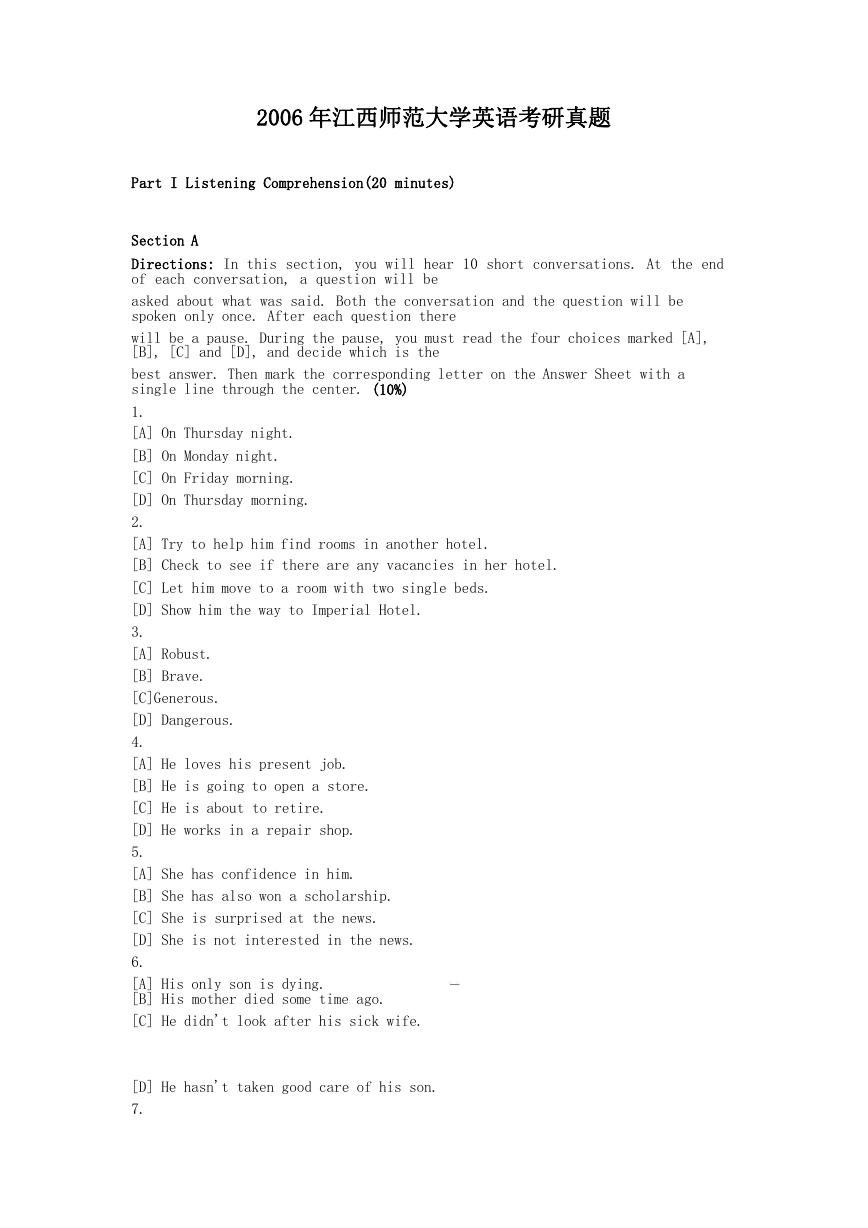
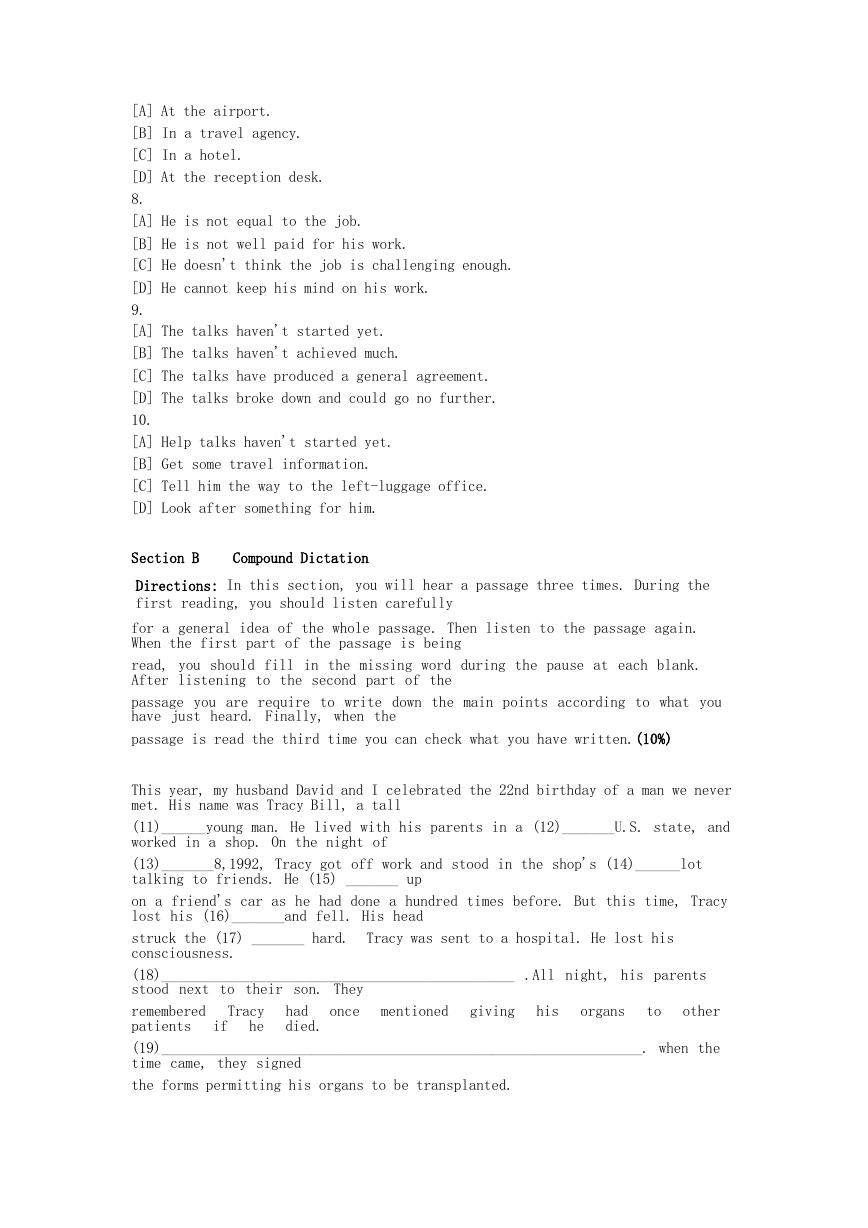
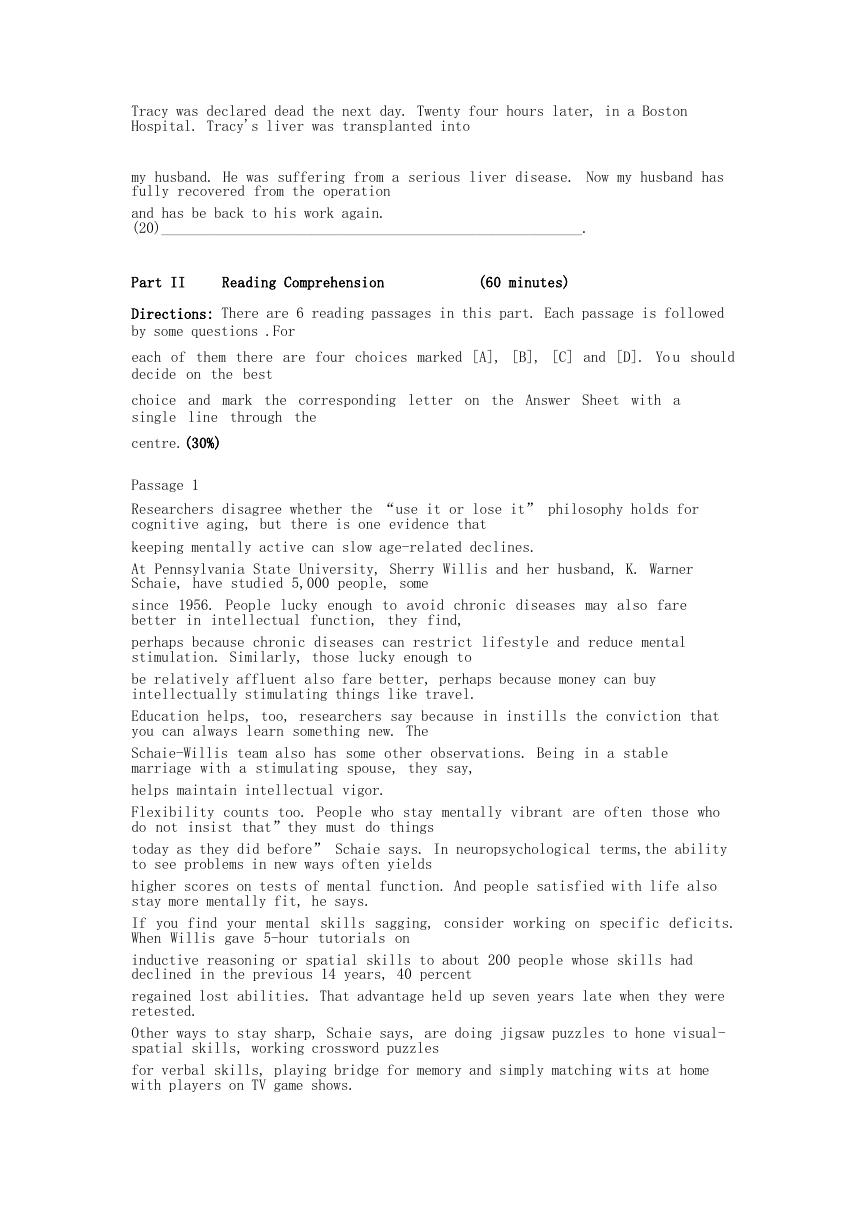
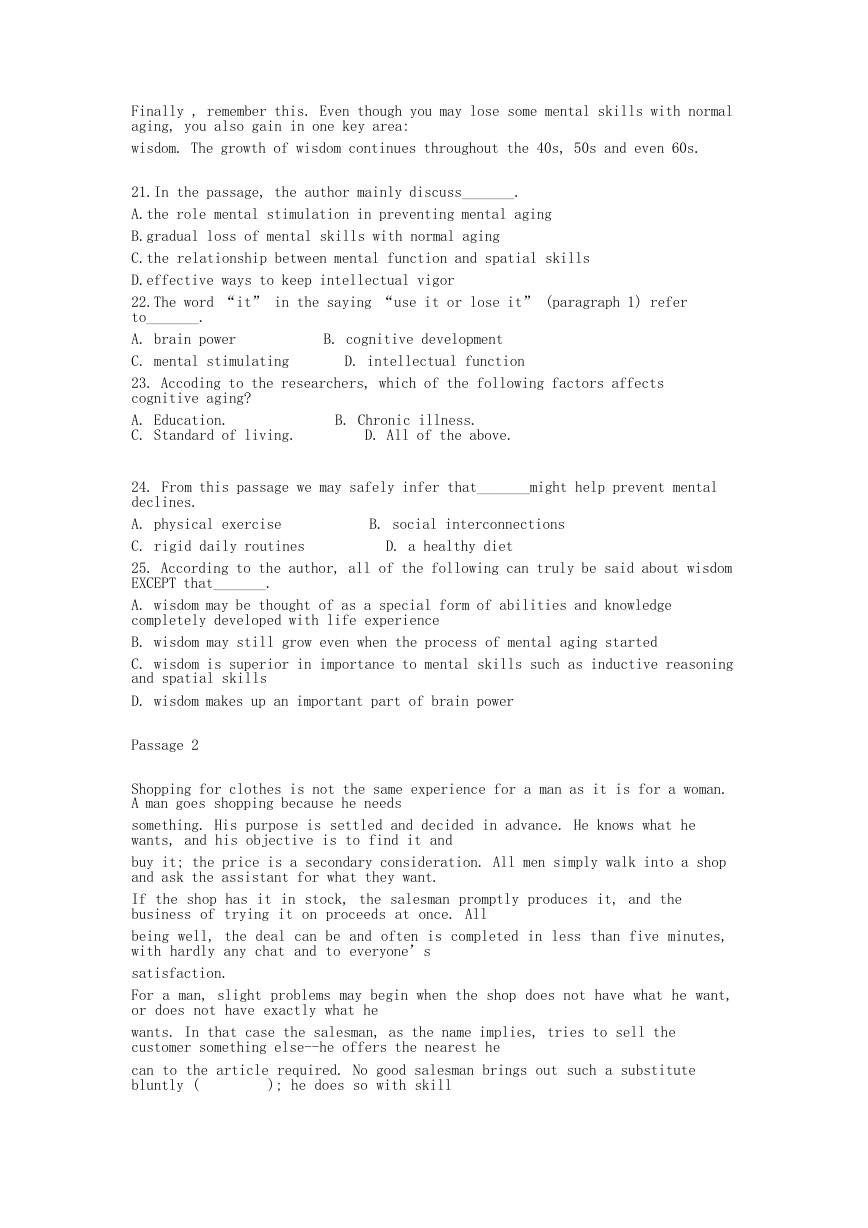
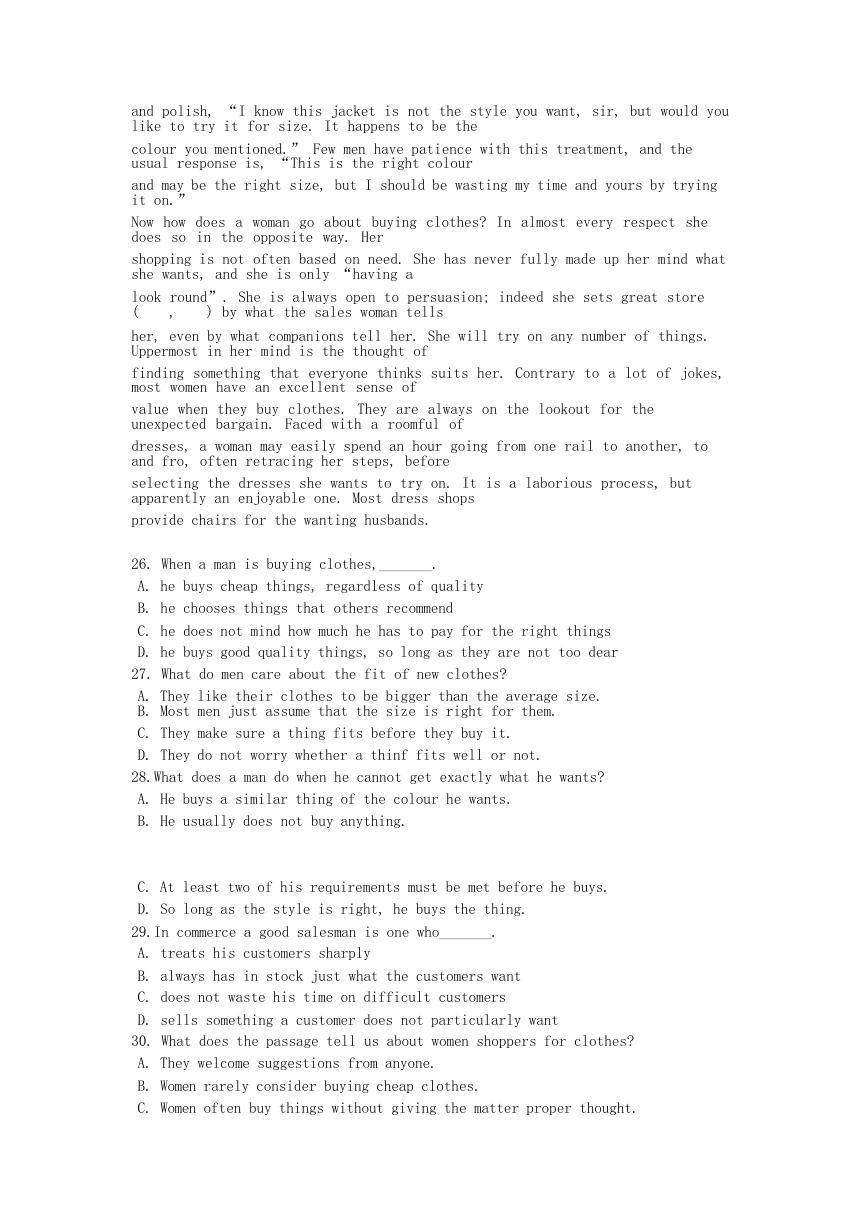

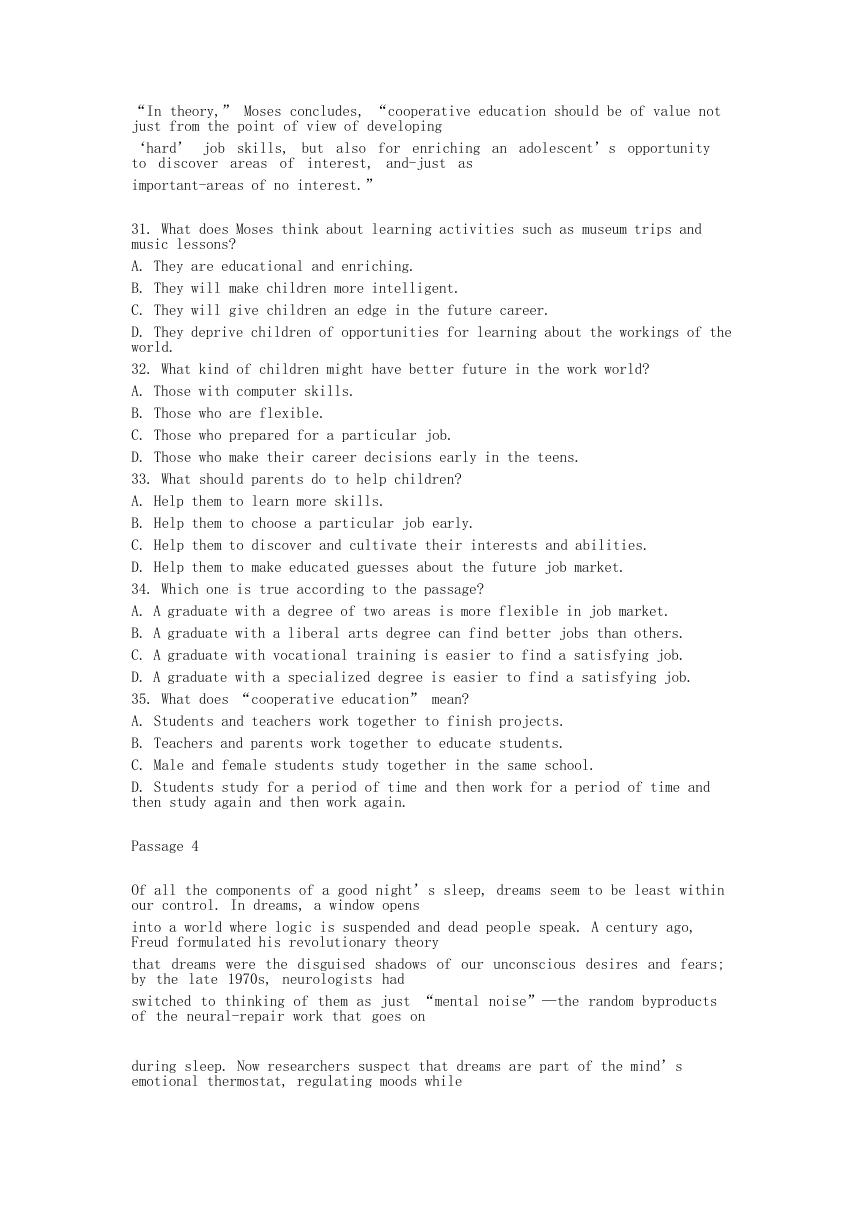
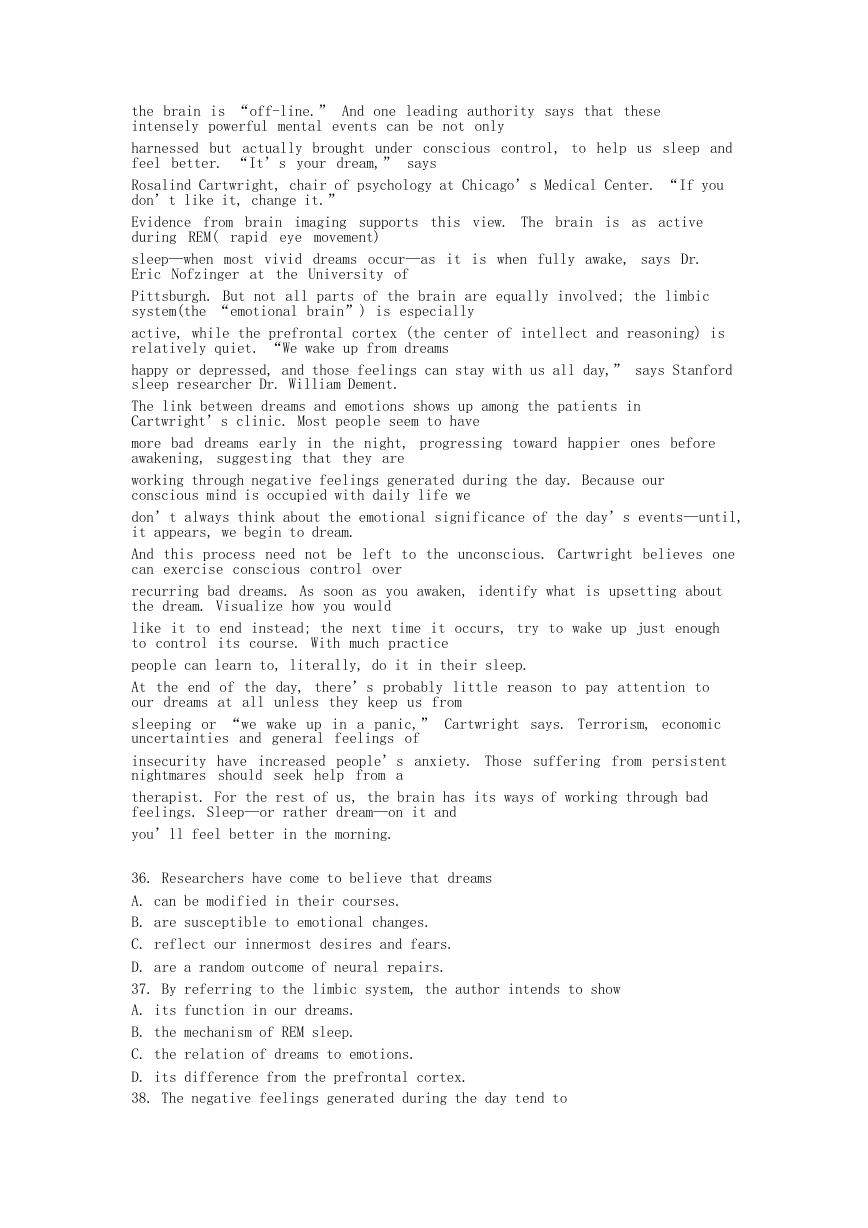








 2023年江西萍乡中考道德与法治真题及答案.doc
2023年江西萍乡中考道德与法治真题及答案.doc 2012年重庆南川中考生物真题及答案.doc
2012年重庆南川中考生物真题及答案.doc 2013年江西师范大学地理学综合及文艺理论基础考研真题.doc
2013年江西师范大学地理学综合及文艺理论基础考研真题.doc 2020年四川甘孜小升初语文真题及答案I卷.doc
2020年四川甘孜小升初语文真题及答案I卷.doc 2020年注册岩土工程师专业基础考试真题及答案.doc
2020年注册岩土工程师专业基础考试真题及答案.doc 2023-2024学年福建省厦门市九年级上学期数学月考试题及答案.doc
2023-2024学年福建省厦门市九年级上学期数学月考试题及答案.doc 2021-2022学年辽宁省沈阳市大东区九年级上学期语文期末试题及答案.doc
2021-2022学年辽宁省沈阳市大东区九年级上学期语文期末试题及答案.doc 2022-2023学年北京东城区初三第一学期物理期末试卷及答案.doc
2022-2023学年北京东城区初三第一学期物理期末试卷及答案.doc 2018上半年江西教师资格初中地理学科知识与教学能力真题及答案.doc
2018上半年江西教师资格初中地理学科知识与教学能力真题及答案.doc 2012年河北国家公务员申论考试真题及答案-省级.doc
2012年河北国家公务员申论考试真题及答案-省级.doc 2020-2021学年江苏省扬州市江都区邵樊片九年级上学期数学第一次质量检测试题及答案.doc
2020-2021学年江苏省扬州市江都区邵樊片九年级上学期数学第一次质量检测试题及答案.doc 2022下半年黑龙江教师资格证中学综合素质真题及答案.doc
2022下半年黑龙江教师资格证中学综合素质真题及答案.doc